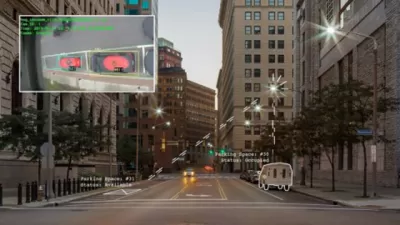The continued improvement of digital technology should benefit evidence-based policy and decision-making. Welcome to a new era of planning simulations.

Laura Adler surveys the world of data-driven simulations in the field of planning. Simulations have been a part of planning practice for decades, as Adler notes, but recent improvements in data collection and computing power empower planners in new and constantly evolving ways.
Adler surveys the latest in technology, grouping the state of the art in simulation into two groups:
Comprehensive Models
- UrbanSim, founded by University of California, Berkeley Professor Paul Waddell, "allows users to run simulations, draw from a library of open data, and produce visualizations."
- MIT's Changing Places initiative has developed CityScope, "an urban simulation tool that integrates physical representation—using Legos—with projections and visualization tools."
- Participatory Chinatown, from Emerson College, "used a multiplayer game format to engage citizens in a number of simulated neighborhood activities inside a digital recreation of Boston’s Chinatown."
Specific Systems
- The "urban intelligence network," or AURIN, from Australia, "is a state-run resource for the nation’s cities and towns that provides datasets and online tools for analysis, modeling, and visualization."
- "In Chicago, the Metropolitan Planning Council developed the TOD Calculator (for Transit Oriented Development) to help residents learn about the economic and sustainability benefits of potential TOD sites."
- Arizona State University researchers developed the Phoenix WaterSim "to help the Phoenix metropolitan government estimate supply and demand in order to effectively manage its limited resources."
The survey includes more examples of each variety. Also included in the article are simple descriptions of the benefits of simulation, including the ability to anticipate and mitigate unintended consequences and to bridge gaps of representation in the planning process.
FULL STORY: SimCities: Can City Planning Mistakes Be Avoided Through Data-Driven Simulations?

Alabama: Trump Terminates Settlements for Black Communities Harmed By Raw Sewage
Trump deemed the landmark civil rights agreement “illegal DEI and environmental justice policy.”

Planetizen Federal Action Tracker
A weekly monitor of how Trump’s orders and actions are impacting planners and planning in America.

The 120 Year Old Tiny Home Villages That Sheltered San Francisco’s Earthquake Refugees
More than a century ago, San Francisco mobilized to house thousands of residents displaced by the 1906 earthquake. Could their strategy offer a model for the present?

In Both Crashes and Crime, Public Transportation is Far Safer than Driving
Contrary to popular assumptions, public transportation has far lower crash and crime rates than automobile travel. For safer communities, improve and encourage transit travel.

Report: Zoning Reforms Should Complement Nashville’s Ambitious Transit Plan
Without reform, restrictive zoning codes will limit the impact of the city’s planned transit expansion and could exclude some of the residents who depend on transit the most.

Judge Orders Release of Frozen IRA, IIJA Funding
The decision is a victory for environmental groups who charged that freezing funds for critical infrastructure and disaster response programs caused “real and irreparable harm” to communities.
Urban Design for Planners 1: Software Tools
This six-course series explores essential urban design concepts using open source software and equips planners with the tools they need to participate fully in the urban design process.
Planning for Universal Design
Learn the tools for implementing Universal Design in planning regulations.
Clanton & Associates, Inc.
Jessamine County Fiscal Court
Institute for Housing and Urban Development Studies (IHS)
City of Grandview
Harvard GSD Executive Education
Toledo-Lucas County Plan Commissions
Salt Lake City
NYU Wagner Graduate School of Public Service





























